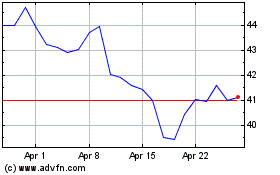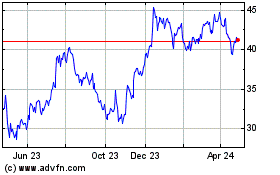CORRECT: JPMorgan Leads Banks Set To Raise Dividend After Stress Test
March 13 2012 - 8:54PM
Dow Jones News
NEW YORK (Dow Jones)--J. P. Morgan Chase & Co. (JPM) led a
number of the biggest U.S. banks in announcing dividend raises and
stock buybacks, after receiving the results of the Federal
Reserve's stress tests.
The Fed said 15 out of 19 banks maintained healthy capital
levels in the stress test scenario. Four firms, including Citigroup
(C), SunTrust Banks Inc. (STI), MetLife Inc. (MET), and Ally
Financial (GMA.XX), failed to meet at least one of the capital
requirements under the hypothetical stress scenario. Ally trailed
the guidelines with Tier One capital below 5% in the test.
Citi said in a statement the Fed objected to its plan to return
capital to shareholders, though it had no objection to its current
dividend levels on preferred and common stock. The bank said it
will submit a revised capital plan to the Fed later this year. The
bank also said it exceeded the stress test requirements without its
planned dividend increase.
MetLife, the only insurer included in the program, said in a
statement it was "deeply disappointed" with the Fed's analysis, and
said the "bank-centric methodologies" of the stress test don't
properly evaluate the financial strength of a life insurer, which
operates under a different business model.
Ally Financial, majority owned by the U.S. government, said the
Fed's assumptions in its test were "inconsistent" with its own
views and "dramatically overstates potential contingent mortgage
risk." Ally continues to have "ongoing constructive discussions"
with regulators surrounding capital and mortgage issues and plans
to submit a revised capital plan in the near future, the company
said, adding that the Fed has not objected to its ongoing payment
of preferred dividends, interest on trust preferred securities and
subordinated debt.
SunTrust didn't respond to a request for comment.
Of the banks that maintained healthy capital levels in the
stress test, Bank of America (BAC) did not seek to raise dividends
or a new buyback authorization. Morgan Stanley (MS) said Tuesday it
received no objection from the Fed for its 2012 capital plan,
including the potential cash acquisition of an additional 14% of
Morgan Stanley Smith Barney and ongoing payment of current common
and preferred dividends. Goldman Sachs Group Inc. (GS), meanwhile,
said it got no objections to plans to repurchase unspecified
amounts of stock and potentially raise its dividend.
USBancorp (USB) boosted its dividend by 56%, and PNC Financial
Corp. (PNC) said it passed the stress test, according to a person
familiar with the matter. BB&T Corp. (BBT) said the Fed had no
objection to it raising its dividend by 4 cents.
Keycorp (KEY) said it will buy back $344 million in stock and
said its board will evaluate an increase in the dividend and make a
decision on that in May.
Bank of New York Mellon Corp. (BK) also said the Fed had no
objections to its plans, which are to buy back $1.16 billion of
stock and continue to pay a 13 cent per quarter dividend this year.
Wells Fargo & Co. (WFC) raised its dividend to 22 cents
retroactively to the first quarter.
Capital One Financial Corp. (COF) did not ask for a dividend
increase or share buyback and said "the results speak for
themselves," and "the bank is comfortable with its capital
levels.
American Express Co. (AXP) said the Fed did not object to its
capital distribution plans, which include buying back up to $4
billion of shares and up to $1 billion in the first quarter of
2013. It also may increase its quarterly dividend to 20 cents from
18 percent, subject to board approval.
The Fed had planned to release the results of this year's
Comprehensive Capital Analysis and Review, or stress tests, on
Thursday afternoon. It moved up the timing to Tuesday
afternoon.
The tests look at how the 19 biggest U.S. banks would fare in a
severe downturn, including an unemployment rate of 13%, a 21%
decline in housing prices and a 50% drop in equity prices.
Many banks are expected to raise dividends and increase share
buybacks four years after the financial crisis as capital levels
have improved and losses from bad loans continued to abate. Last
year was the first time since the crisis that several banks were
allowed to raise dividends.
In a report last month, Credit Suisse analysts estimated U.S.
banks could double their capital payouts to shareholders,
projecting an average of 47% of their earnings in 2012, up from 23%
last year.
Of the 19 banks subject to this year's test, Regions Financial
Corp. (RF) is the only one left that hasn't repaid funds received
under the Troubled Asset Relief Program, the crisis-year emergency
fund used to shore up bank capital levels.
Regions said Tuesday it would raise $900 million in common stock
to pay $3.5 billion in TARP funds.
Bank stocks jumped in afternoon trading on the stress test
results. JPMorgan's shares surged 7.03%, to $43.43 and Bank of
America shares rose 6.26%, to $8.49. Morgan Stanley rose 4% to
$18.93. USBank rose 4.8%, to $31.01, while PNC rose 4.1%, to
$61.94. BB&T rose 3.7% to $30.40.
--Dan Fitzpatrick, Brett Philbin, Erik Holm and Andrew Johnson
contributed to this report.
-By Liz Moyer, Dow Jones Newswires; 212-416-2512;
liz.moyer@dowjones.com
US Bancorp (NYSE:USB)
Historical Stock Chart
From Apr 2024 to May 2024

US Bancorp (NYSE:USB)
Historical Stock Chart
From May 2023 to May 2024
